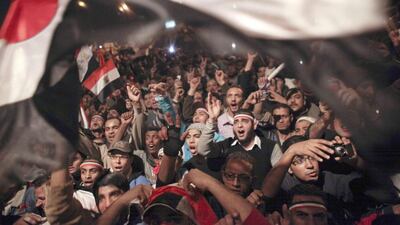It is remarkable, seven years after the beginning of the Arab uprisings, that the message of that time appears to have been completely forgotten, both in parts of the Middle East and among countries outside.
What began as demonstrations in favour of freedom, democracy and good governance quickly descended into widespread violence and the collapse of several states, such as Syria, Libya and Yemen. As a consequence, the initial impulse of the revolts has been forgotten, to the advantage of those defending stability in the context of an inflexible reading of the national interest.
Western countries, where the idea of Arab democracy would, presumably, have provoked more sympathy, proved to be just as wary of its consequences in the region, behind a facade of defending democracy and human rights. Because of the threat of jihadi groups, they soon abandoned those who were fighting for their freedom. That is why even if Bashar Al Assad’s future remains uncertain today, few leaders are calling for his departure as a precondition for a negotiated end to the Syrian conflict.
The United States in particular has played a profoundly negative role since 2011. Former president Barack Obama was always someone more fearful of disorder and commitment than he was supportive of democracy. This was particularly true in Syria, where behind periodical assurances that Mr Al Assad's rule had ended, Mr Obama did nothing to change the balance to the rebels' advantage, even before the arrival of radical Islamic groups such as the Nusra Front and ISIL.
Donald Trump has, similarly, had little concern for what happens in Syria. His administration has made contradictory statements about its desired political outcome for the country but has been largely absent from all of the diplomatic tracks on Syria, whether in Geneva or Astana. Given his narrow nationalistic agenda, Mr Trump has no interest in spreading human rights, democracy and good governance, which are all motivated by a universalist approach to foreign affairs. Indeed, there is some question as to whether the president even considers such aims important.
However, do the Arab states benefit from adopting a similar transactional line on domestic and foreign relations? The political realism that permeates the region, the priority of pursuing the national interest, has often posed problems for the Arab states. It is what left them hopelessly divided during the 1948 Arab-Israeli war. It was the cause of the Arab cold war in the 1950s and 1960s. And today, it is why Arab states seem unable to co-ordinate a unified response to the Iranian threat, or even to those issues over which there is a consensus, such as the status of Jerusalem.
That is not to say, of course, that states in the region must give up on their national interests. However, defending universal values, much like placing collective interest before the national interest in given situations, can often be a more effective way of improving a country's position and welfare.
The United States has gained a great deal from projecting a democratic image abroad. That doesn’t imply that its democratic efforts have succeeded everywhere, but they have been a fundamental part of its dealings and its soft power overseas, particularly since the end of the Second World War.
Similarly, the European Union learned long ago the advantages of sacrificing aspects of national sovereignty in favour of political and economic collaboration that would benefit all. The European project has certainly faced difficulties but not as many as those countries that have sought a break with Europe, as the current negotiations over Britain’s exit from Europe have highlighted.
In other words, promoting universal values and transnational interests, and occasionally yielding on national sovereignty, is a basic instrument of international relations. How does advancing universal values tie in with the Arab uprisings? By providing Arabs with something to which they can aspire. That many western countries deserted the Arabs after 2010 was a testament to their shortsightedness, because if problems are not adequately addressed, nothing guarantees that uprisings will not resume in the future.
The aspiration for stability is understandable. But immovability is hardly stabilising, as it increases frustrations among an increasingly younger population in the region’s countries. Adopting an insular definition of national interest, one that dismisses universal values and transnational interests in a world where such ideas can circulate freely via the internet, is a recipe for disaster.
Not surprisingly, the man of the moment is Russian president Vladimir Putin. He is the outsider many leaders in the region trust. His philosophy of iron stability at least has the merit of being clear, whereas Washington, depending on who is in office, remains erratic. But from 2010 to 2011, the US happened to be closer to Arab realities. That it refuses to draw the lessons of that fateful period is shameful.
Michael Young is editor of Diwan, the blog of the Carnegie Middle East programme, in Beirut


